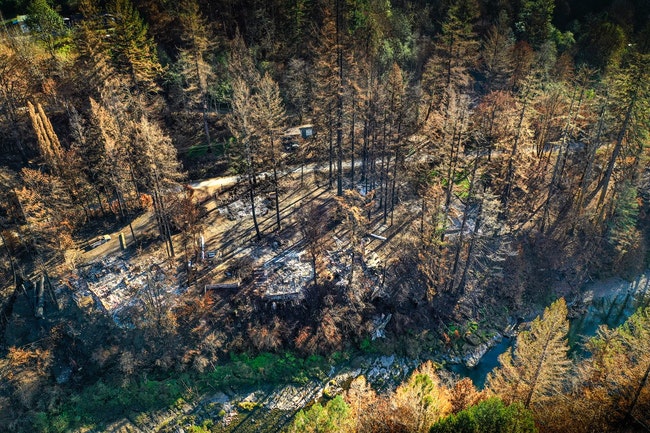
Wildfire damage along the Little North Fork River in October 2020 following the Beachie Creek Fire (Ron Cooper/Salem Reporter)
Despite an exceptionally wet spring, Oregonians surveyed in early June overwhelmingly expect a future of increased wildfires across the state, according to a recent survey.
The Oregon Values and Belief Center, a nonpartisan public opinion research organization, received 1,500 responses to an online survey sent to adults across the state during the first week of June.
Nearly 90% of respondents expect wildfires in the state to increase during the next decade.
“As Oregonians often struggle to bridge ideological divides, there is widespread common ground when it comes to concerns about the effects of wildfires on Oregon, regardless of political party, income, education or age,” the report’s authors wrote.
So far, Oregon’s fire season has been mild. Since May there have been 30 human-caused fires in the state, according to the National Interagency Fire Center, most of which burned less than an acre. People are responsible for many of the fires in the state.
Persistent drought conditions put the state at risk for large wildfires this year, despite above-average rainfall in April, May and June.
According to the National Oceanic and Atmospheric Administration, the West is in the worst drought in 1,200 years and the driest 22-year period on record. Most of central Oregon is in an “exceptional drought.”
The National Interagency Fire Center has forecast a higher than normal risk for wildfires in southern Oregon by July.
By August, the fire center forecasts that most of the Northwest will face above normal risk for potential wildfires.
One in five Oregonians said they have had to evacuate their home due to a wildfire, according to the survey, though the lowest levels of concern among respondents were for damage to personal property.
More than 75% of respondents across age, political affiliation, income, education and gender expressed greater worry over the loss of wildlife and fish habitat in the state due to growing wildfires. Nearly 80% believe there will be significant loss of state forests during the next decade due to heat and drought.
Few respondents approved of the way that wildfires are prevented in Oregon. Less than half approved of wildfire management undertaken by private landowners and state government. Nearly 80% of logging in Oregon takes place on private lands, according to the Oregon Forest Resources Institute.
One survey respondent wrote, “Timber companies do not want to log weak, sick, damaged trees in dense forest. Timber companies do not want to log trees killed by fire. They want access to log the large, old healthy trees that survived fire and density. There is no profit for them in small, destroyed trees. A tree’s ability to survive (or come back) from a fire is greatly underestimated in the logging debate.”
Less than one-third of the respondents approved of the management of forests for wildfire prevention on federal lands in Oregon. About 60% of Oregon’s forestland is owned by the federal government, according to the Forest Resources Institute.
Nearly 70% of Oregonians support limiting new home construction in fire-prone areas.
Oregon Capital Chronicle is part of States Newsroom, a network of news bureaus supported by grants and a coalition of donors as a 501c(3) public charity. Oregon Capital Chronicle maintains editorial independence. Contact Editor Les Zaitz for questions: [email protected]. Follow Oregon Capital Chronicle on Facebook and Twitter.
STORY TIP OR IDEA? Send an email to Salem Reporter’s news team: [email protected].









